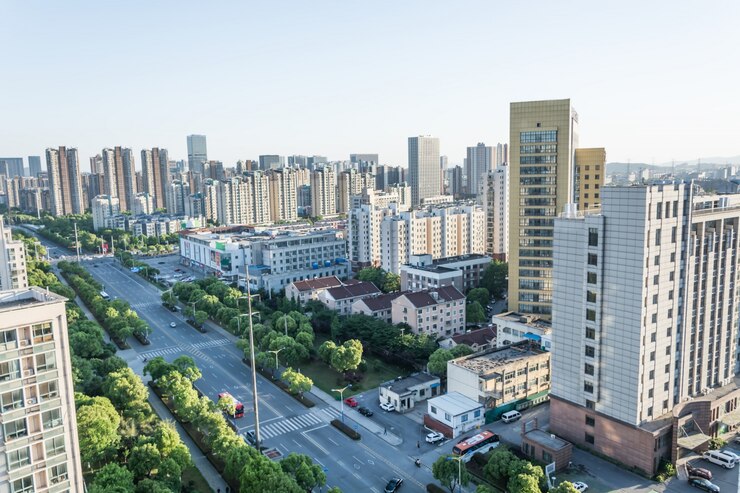ABU DHABI
Abu Dhabi, the largest emirate & capital city of UAE. Abu Dhabi houses local and federal government offices and is the home of the UAE government and the supreme council for financial & economic affairs. Abu Dhabi’s rapid development and urbanization, coupled with the massive oil and gas reserves and production and relatively high average income, have transformed it into a large, developed metropolis. It is the country’s center of politics and industry, and a major culture and commerce center. Abu Dhabi accounts for about two-thirds of the roughly $503 billion boasts 200 islands and 700 km of coastline.


It is a vital player in the UAE’s economic and political landscape, with around 96% of the country’s oil reserves. To propel diversification, the Abu Dhabi economic vision 2030 is focused on key sectors such as finance, ICT, agri-tech, tourism and manufacturing. The Abu Dhabi Plan, meanwhile, which was initiated in 2016, aims to create a thriving private sector and enhance business opportunities. Despite headwinds stemming from the Covid-19 pandemic, Abu Dhabi is making strides toward a diversified, globally integrated economy. Priorities include knowledge-based sectors like tourism, manufacturing, logistics, health care, education, financial services and ICT.
WHY ABU DHABI IS CONSIDERED A GREAT PLACE TO START A BUSINESS OR START UP.
The strategic location , situated at the crossroads of Europe, Asia, and Africa, Abu Dhabi offers easy access to emerging markets. The city has modern infrastructure and excellent connectivity, including world-class airports, seaports, and road networks. The government of Abu Dhabi provides support to businesses through various programs, initiatives, and investment incentives. Abu Dhabi offers a high quality of life with excellent healthcare, education, and leisure facilities, making it an attractive destination for professionals and their families. The city is home to a diverse population, providing businesses with access to a multicultural talent pool and diverse consumer markets.


STRONG ECONOMIC GROWTH
Abu Dhabi contributes around 60% of the UAE’s GDP, with the country holding the world’s fifth-largest proven oil reserves, primarily located in Abu Dhabi. The emirate prioritizes diversifying its economy and empowering the private sector. Timely fiscal interventions and robust sovereign assets have helped to cushion the Covid-19 pandemic’s impact, while forward-thinking policies and an attractive business environment are positioning Abu Dhabi for post-pandemic growth. Its focus on diversification and foreign investment in knowledge-based industries seeks to chart a course to a resilient economic future. The vision of a sustainable, diversified and open economy outlined in the Abu Dhabi economic vision 2030 is guiding the emirate’s policies. This ambitious roadmap centers around reducing reliance on oil and gas,increasing the role of knowledge-based industries and fostering a dynamic private sector, with Abu Dhabi’s determination to achieve these goals underscoring its commitment to long-term economic sustainability..Here, the government has long been investing heavily in the economy to reduce and diversify the country’s reliance on oil revenue, which continues to play a crucial role in the country’s economy, especially in Abu Dhabi.


REASON TO INVEST
Abu Dhabi is a very promising market in the middle east region, which has been showing steady growth and expansion for several years. To attract foreign investors’ attention, the UAE government takes various initiatives every year to keep the country’s economy at top gear. UAE has a liberal policy that encourages foreign investors to invest and participate in mutual growth processes. Abu Dhabi’s commitment to diversification and improving its business environment led the emirate to record the MENA region’s fastest economic growth rate in 2022, at 9.3%. The focus on strengthening and diversifying manufacturing lines, alongside enhancing export capabilities, is propelling continued growth. Regulatory updates and progressive development strategies seek to revitalize foreign direct investment across key sectors such as real estate and high-value manufacturing. Collaborative efforts to bolster international trade and dynamic government bodies are helping to improve Abu Dhabi’s investment climate, fostering a thriving economy. As a result, Abu Dhabi has become a magnet for international investors, companies and entrepreneurs. The emirate’s expanding production profile is being harnessed to drive exports, contributing significantly to economic expansion. The synergy between public and private entities, exemplified by organizations like mubadala investment company and ADQ, showcases the government’s commitment to driving growth and enhancing business ecosystems. There are numerous reasons for investing in the country’s economy, including a specially designed plan for modernizing and reforming the economy, innovations in the field of business promotion, and lots more to stimulate local economic growth and development.




EASE OF BUSINESS
The UAE has continued to lead in the Middle East and Arab region in the 2020 ranking of the World Bank’s ease of doing business with 16th position in the 190 countries world ranking. UAE has been catapulted to the global stage by its long-standing foreign perspective, liberal economic policies, good governance, and willingness to meet the needs of the business community. It has demonstrated to offer a secure, efficient, and forward-looking network eco-system for increased growth.
BANKING
Abu Dhabi’s banking sector thrives in a globally connected economy, supported by solid capitalisation, credit growth and profitability. The embrace of technological innovation and financial technology, coupled with strengthened cybersecurity and anti money-laundering measures, positions Abu Dhabi’s banks for continued growth. High oil prices and a robust non oil sector are expected to drive further expansion as digitalisation improves efficiency. At the same time, an ongoing commitment to regulatory and supervisory improvements is enhancing Abu Dhabi’s global standing and reinforcing its financial stability. Amid global efforts to tackle inflation, interest rates are expected to remain relatively high, though Abu Dhabi’s lenders are well provisioned to remain profitable. Credit growth is ongoing, albeit at a slower pace, as digitalisation efforts continue to enhance customer service while reducing operating costs. The broader UAE banking sector’s stability and continuity in the face of global challenges underscore its resilience.


BANKING
Abu Dhabi’s banking sector thrives in a globally connected economy, supported by solid capitalisation, credit growth and profitability. The embrace of technological innovation and financial technology, coupled with strengthened cybersecurity and anti money-laundering measures, positions Abu Dhabi’s banks for continued growth. High oil prices and a robust non oil sector are expected to drive further expansion as digitalisation improves efficiency. At the same time, an ongoing commitment to regulatory and supervisory improvements is enhancing Abu Dhabi’s global standing and reinforcing its financial stability. Amid global efforts to tackle inflation, interest rates are expected to remain relatively high, though Abu Dhabi’s lenders are well provisioned to remain profitable. Credit growth is ongoing, albeit at a slower pace, as digitalisation efforts continue to enhance customer service while reducing operating costs. The broader UAE banking sector’s stability and continuity in the face of global challenges underscore its resilience.


CAPITAL MARKETS
Abu Dhabi plays a central role in regional capital markets development, attracting government-owned companies seeking listings and contributing to sustainable asset regulatory frameworks. Amid global economic challenges, Abu Dhabi remains an attractive investment destination, with strong demand for its debt and a robust initial public offering (IPO) pipeline. Forward-looking regulatory measures, including carbon credit trading, are enhancing its appeal as the emirate continues to expand after the Covid-19 pandemic. Abu Dhabi’s economic trajectory, coupled with regulatory foresight, positions it as a promising investment opportunity in a changing global landscape. With fluctuating inflation and slowed productivity growth in developed markets, Abu Dhabi stands out as an attractive investment opportunity.
INSURANCE
Abu Dhabi’s insurance sector has been boosted by post-Covid-19 pandemic recovery and a competitive landscape. Gross written premium and underwriting income continue to rise, particularly for health and medical coverage. Digitalisation, competition and potential market consolidation are expected to shape the sector’s future, and Abu Dhabi-based providers stand well positioned to benefit from ongoing economic growth and a broadening market, especially with the expansion of compulsory medical coverage. Factors like the IFRS 17 transition and post pandemic medical costs are expected to drive improved financial performance. While the level of competition remains high, companies adapting to regulatory controls and solvency requirements will flourish in the evolving landscape. The growth in the number of active policies issued indicates strong market demand.


INSURANCE
Abu Dhabi’s insurance sector has been boosted by post-Covid-19 pandemic recovery and a competitive landscape. Gross written premium and underwriting income continue to rise, particularly for health and medical coverage. Digitalisation, competition and potential market consolidation are expected to shape the sector’s future, and Abu Dhabi-based providers stand well positioned to benefit from ongoing economic growth and a broadening market, especially with the expansion of compulsory medical coverage. Factors like the IFRS 17 transition and post pandemic medical costs are expected to drive improved financial performance. While the level of competition remains high, companies adapting to regulatory controls and solvency requirements will flourish in the evolving landscape. The growth in the number of active policies issued indicates strong market demand.


ENERGY
Abu Dhabi’s ongoing transition from a fossil fuel-dependent economy to one driven by clean energy marks a significant shift. Hosting the Arab world’s first nuclear power plant and the largest single-site solar power plant, the emirate plays a pivotal role in this transition. While hydrocarbons remain integral to the broader UAE’s economy, global energy shifts and geopolitical tensions have increased the importance of natural gas. Despite a potential economic slowdown in 2023-24, the UAE’s hosting of the COP28 UN conference on climate change opens new doors for the energy sector, fostering strategic partnerships and investment. Unconventional gas and blue and green hydrogen are key growth avenues, driving collaboration in production, storage, transport and related technologies for cleaner energy alternatives.
TRANSPORT
Abu Dhabi’s transport sector is an important driver of economic growth. The completion of stage two of the Etihad Rail network and the imminent opening of a new terminal at Abu Dhabi International Airport are among the sector’s key milestones. This sector has experienced significant gains, with tourism and commercial activities rebounding in the wake of the Covid-19 pandemic. Abu Dhabi continues to pioneer innovative solutions, such as autonomous vehicles, water taxis and artificial intelligence-driven traffic management, aimed at easing congestion and reducing pollution. However, the deployment of advanced technologies also presents regulatory and partnership challenges. Navigating these hurdles will require agile regulators and robust public-private collaboration. Innovation not only benefits Abu Dhabi residents, but also offers valuable insights for observers around the world who are keen to learn from the emirate’s experiences in pioneering modern transport solutions.


TRANSPORT
Abu Dhabi’s transport sector is an important driver of economic growth. The completion of stage two of the Etihad Rail network and the imminent opening of a new terminal at Abu Dhabi International Airport are among the sector’s key milestones. This sector has experienced significant gains, with tourism and commercial activities rebounding in the wake of the Covid-19 pandemic. Abu Dhabi continues to pioneer innovative solutions, such as autonomous vehicles, water taxis and artificial intelligence-driven traffic management, aimed at easing congestion and reducing pollution. However, the deployment of advanced technologies also presents regulatory and partnership challenges. Navigating these hurdles will require agile regulators and robust public-private collaboration. Innovation not only benefits Abu Dhabi residents, but also offers valuable insights for observers around the world who are keen to learn from the emirate’s experiences in pioneering modern transport solutions.


REAL ESTATE & CONSTRUCTION
Abu Dhabi’s real estate and construction sectors performed well in 2022, contributing significantly to the emirate’s non-oil growth. Construction expanded by 7.6%, reaching Dh86bn ($23.4bn), or 7.8% of Abu Dhabi’s total GDP. At the same time, the real estate market witnessed an 8.5% increase in transaction values and a 27.2% rise in transaction volumes, reflecting strong market activity. Several anticipated real estate projects are under way, bolstering the market’s international appeal and adding to supply forecasts for the coming years. Business confidence remains high, creating an environment conducive to further investment in the sector. Opportunities abound in both the residential and commercial segments, driven by a robust project pipeline, increased foreign direct investment, infrastructure development and the resurgence of tourism. This outlook reflects a dynamic market catering to diverse preferences, benefitting investors, developers and residents.
AGRICULTURE & FOOD SECURITY
Abu Dhabi, occupying 84% of the UAE’s landmass, plays a crucial role in agriculture and food security. The emirate is investing significantly in strengthening supply and value chains to enhance food-production systems and meet the population’s nutritional needs. The Covid-19 pandemic and global geopolitical tensions have prompted a re-evaluation of food security strategies, emphasizing localized supply chains. Abu Dhabi is central to this discussion, given its resources and geographic location. The agriculture sector is undergoing transformation, driven by collaboration between public and private entities, which presents opportunities for international investors, aided by improvements in investment legislation. The emirate’s focus on agri-tech development offers an opening for start-ups to contribute to sector growth.


AGRICULTURE & FOOD SECURITY
Abu Dhabi, occupying 84% of the UAE’s landmass, plays a crucial role in agriculture and food security. The emirate is investing significantly in strengthening supply and value chains to enhance food-production systems and meet the population’s nutritional needs. The Covid-19 pandemic and global geopolitical tensions have prompted a re-evaluation of food security strategies, emphasizing localized supply chains. Abu Dhabi is central to this discussion, given its resources and geographic location. The agriculture sector is undergoing transformation, driven by collaboration between public and private entities, which presents opportunities for international investors, aided by improvements in investment legislation. The emirate’s focus on agri-tech development offers an opening for start-ups to contribute to sector growth.


EDUCATION & RESEARCH
Education and research hold pivotal roles in Abu Dhabi’s broader development effort. The emirate is committed to enhancing human capital through curriculum redesign, increased research and innovation capacities, and technology integration in the education sector. Recent initiatives and partnerships have channeled expertise and funding into specific educational areas, bolstering Abu Dhabi’s regional and international reputation in the education sector. Advancements in technology are opening new avenues for investment and development, positioning Abu Dhabi as a global leader in education. The emirate’s continued progress in international attainment tests reflects its ambition to contribute significantly to economic expansion by nurturing a highly skilled workforce and fostering innovation through education and research.
HEALTH
Abu Dhabi’s health care sector is flourishing, contributing progressively to the emirate’s GDP growth. Government strategies and initiatives aim to attract more private investment, resulting in the establishment and strengthening of international health care stakeholders, specialized facilities, pharmaceutical manufacturers and research entities in Abu Dhabi. Recent changes in mandatory health insurance regulations have been implemented to improve the business environment in Abu Dhabi. The health care sector offers an attractive investment destination, with opportunities across various specialties, including logistics, manufacturing, medical technologies, and the development of hospitals and health centers. While challenges remain in managing non-communicable and lifestyle-related diseases, the emirate’s proactive policies are expected to address these issues and further boost the health care sector’s contribution to Abu Dhabi’s socio-economic development and prosperity.


HEALTH
Abu Dhabi’s health care sector is flourishing, contributing progressively to the emirate’s GDP growth. Government strategies and initiatives aim to attract more private investment, resulting in the establishment and strengthening of international health care stakeholders, specialized facilities, pharmaceutical manufacturers and research entities in Abu Dhabi. Recent changes in mandatory health insurance regulations have been implemented to improve the business environment in Abu Dhabi. The health care sector offers an attractive investment destination, with opportunities across various specialties, including logistics, manufacturing, medical technologies, and the development of hospitals and health centers. While challenges remain in managing non-communicable and lifestyle-related diseases, the emirate’s proactive policies are expected to address these issues and further boost the health care sector’s contribution to Abu Dhabi’s socio-economic development and prosperity.


TOURISM & CULTURE
Abu Dhabi’s tourism industry witnessed substantial growth in the years leading up to the Covid-19 pandemic. The economy was insulated by government policies and relief packages during the crisis, with effective measures implemented to control the virus’s spread. Today, Abu Dhabi’s tourism operators are experiencing a resurgence in international visitors, marking a strong recovery for the sector. Tourism and cultural activities remain central to Abu Dhabi’s economic diversification efforts, with various investment initiatives aimed at expanding the emirate’s range of leisure and cultural attractions. These endeavors, coupled with the sector’s capacity for job creation, have been largely successful to date. Continued growth in tourist arrivals is expected as Abu Dhabi’s cosmopolitan image, along with substantial public and private investment, positions the emirate to capitalise on the increasing international recognition of the region’s cultural and leisure offerings. Abu Dhabi’s reputation as a welcoming, safe and diverse destination with robust international connectivity bodes well for future expansion.
INFRASTRUCTURE
The UAE government has built an adequate infrastructure for the Emirates population in the last 40 years, including electricity, transportation, telecommunications, housing, and hospitals. All of these are largely subsidized. Significant infrastructural development is vital to a country’s long-term economic progress, and in this regard, the Abu Dhabi is becoming more cautiously optimistic for investors. The country places great emphasis on building infrastructure and sees it as the foundation of economic and social growth. Overall, the UAE was ranked 1st regionally and 25th worldwide, keeping its leading position among the world’s competitive economies. Plan Abu Dhabi 2030 – urban structure framework Plan’ is designed to help Abu Dhabi government filter and respond to current and future development needs, establish a planning culture and introduce strong guiding principles for new development. It provides conceptual solutions to shape the growth of Abu Dhabi.


INFRASTRUCTURE
The UAE government has built an adequate infrastructure for the Emirates population in the last 40 years, including electricity, transportation, telecommunications, housing, and hospitals. All of these are largely subsidized. Significant infrastructural development is vital to a country’s long-term economic progress, and in this regard, the Abu Dhabi is becoming more cautiously optimistic for investors. The country places great emphasis on building infrastructure and sees it as the foundation of economic and social growth. Overall, the UAE was ranked 1st regionally and 25th worldwide, keeping its leading position among the world’s competitive economies. Plan Abu Dhabi 2030 – urban structure framework Plan’ is designed to help Abu Dhabi government filter and respond to current and future development needs, establish a planning culture and introduce strong guiding principles for new development. It provides conceptual solutions to shape the growth of Abu Dhabi.

TALENT ACQUISITION
The UAE was ranked highest in the region and 19th in the world among 119 countries in a recently published global talent competitiveness Index in competition for entrepreneurial talent. The UAE has always embraced talent from various regions and is open to other ideas from diverse people across the globe. The country aims to empower and drive local innovation through the development of young local talent and luring international talent with a firm reliance on engineering, science, technology, entrepreneurship, and mathematics. Our top-notch higher-education facilities offer the perfect atmosphere for cultivating promising young talent and leading innovators and the next generation.
QUALITY OF LIFE
Abu Dhabi has been ranked the most liveable city in the region for the second year in a row, according to the global liveability Index 2021, issued by the economist intelligence unit (The EIU) – the research and analysis division of economist group. The index surveys the 140 most livable cities in the world according to 30 factors. It measures the world’s best cities to live in based on the level of luxury and comfort of living in each city, according to a set of criteria and determinants, which are stability, quality of healthcare, culture and environment, quality of education and infrastructure. Each city receives a score for each criterion, according to the economist intelligence unit’s classification.
Abu Dhabi retained the top spot in the Arab world, followed by Dubai, as the best city to live in the Middle East, despite the global challenges imposed by the pandemic that affected the ranking of cities in terms of quality of life in these cities, which resulted in a decline in the ranking of some European cities are included in the index.


The standard of living and services the Abu Dhabi offers are incomparable. Abu Dhabi is consistently preferred by expats as a country to live because of the outstanding quality of life with modern housing and medical facilities, highly developed infrastructures, and excellent private schools. Most significantly, the trust, stability, and leadership qualities imparted by the country’s government help maintain faith in the country’s long-term future and its capacity to deliver on its ever more ambitious goals. The Abu Dhabi also provides its residents with extensive infrastructure, security and safety, world-class healthcare facilities at an attractive cost, a favorable business climate, and a vibrant job market.
TYPES OF COMPANY STRUCTURE IN ABU DHABI MAINLAND.
LETS GET STARTED
We are your trusted partners. We simplify your entrepreneur journey. Lets make a journey together.

